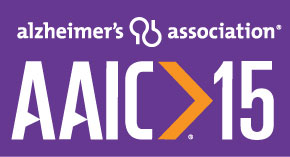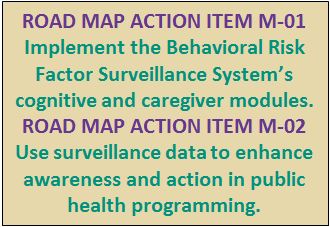|
Memory Complaints Are a Harbinger of Things to Come
 The 2015 Alzheimer’s Association International Conference (AAIC) came to a close today, but not before a few final sessions this morning, including some important study results relevant to the public health community. The 2015 Alzheimer’s Association International Conference (AAIC) came to a close today, but not before a few final sessions this morning, including some important study results relevant to the public health community.
For the past couple of years, research has increasingly suggested that subjective cognitive decline (SCD) – self-reporting of increased memory problems – is a good predictor of future mild cognitive impairment (MCI) and dementia. Not everyone with SCD will go on to develop more serious conditions, but the evidence strongly suggests the risk is much greater. Today, Dr. Ron Petersen of the Mayo Clinic reported on a study involving participants in the Mayo Clinic Study of Aging. It concluded that even after controlling for age, education, sex, APoE ε4 gene status, depression, anxiety, global cognition, and comorbidities, SCD predicted progression to MCI.
For researchers, this is significant as SCD may be useful in selecting individuals for prevention trials. But it is also significant for the public health community. The Cognitive Module for the annual Behavioral Risk Factor Surveillance System (BRFSS) survey asks respondents aged 45 and older if they are experiencing increased confusion or memory loss that has gotten worse in the previous 12 months. In effect, it is a measure of SCD – and therefore an indication of the population at greater risk for developing MCI and dementia. Combined with the module’s questions on the burden created by increased memory problems and whether individuals have talked to a health care provider about their memory problems, the BRFSS data, if collected by states, can serve as a great tool to aid public health officials in planning and programmatic decisions. The Cognitive Module for the annual Behavioral Risk Factor Surveillance System (BRFSS) survey asks respondents aged 45 and older if they are experiencing increased confusion or memory loss that has gotten worse in the previous 12 months. In effect, it is a measure of SCD – and therefore an indication of the population at greater risk for developing MCI and dementia. Combined with the module’s questions on the burden created by increased memory problems and whether individuals have talked to a health care provider about their memory problems, the BRFSS data, if collected by states, can serve as a great tool to aid public health officials in planning and programmatic decisions.
Regular and vigorous physical activity can reduce the risk of cognitive decline and may also reduce the risk of dementia. In healthy older adults, studies suggest physical exercise can improve cognition. But, can exercise do even more? Can it serve as a treatment for those who already have Alzheimer’s or other dementias? Results from three randomized controlled trials (RCTs) of aerobic exercise reported at AAIC today indicate the answer may be “yes.” Specifically:
- A Danish RCT of moderate to high intensity exercise in people with mild to moderate Alzheimer’s disease found exercise reduced neuropsychiatric symptoms and improved mental speed and attention.
- Researchers from Wake Forest University reported that an RCT of moderate-to-high intensity aerobic exercise among older adults with MCI lowered tau levels – one of the hallmarks of Alzheimer’s disease – and improved memory and thinking skills, including executive function.
- An RCT in Canada of individuals with vascular cognitive impairment found that supervised hour-long aerobic exercise three times a week improved cognitive function, including memory and selective attention.
Meet the Public Health Grad Student Scholarship Winners
As part of its Healthy Brain Initiative Cooperative Agreement with the Centers for Disease Control and Prevention (CDC), the Alzheimer’s Association recently awarded scholarships to two public health graduate students to support their work on issues related to cognitive health, dementia, and related caregiving. In addition to the scholarship, the two award winners were treated to a week at AAIC.
Nicole Armstrong is a doctoral candidate at the Johns Hopkins Bloomberg School of Public Health. Her project will examine the association between late-life depression and cognitive decline. Elvira Jimenez, a doctoral candidate at the University of California-Los Angeles, is examining the unique experiences and challenges faced by caregivers of people with younger-onset dementia.
Both award winners found AAIC to be a rewarding and enriching experience. “There have been many networking opportunities to nurture new investigators as they start their careers,” said Armstrong. She added that AAIC afforded her the chance “to learn about current cutting-edge research and inspire ideas for new projects.”
Jimenez noted, “It was exciting to see the diverse research as well as the passion and commitment by the research community. It was particularly enriching to interact with the public health community involved in this effort.”
Goodbye Washington, Get Ready Toronto
AAIC is the world’s largest conference of its kind. This year in Washington, DC, over 4,500 researchers from 65 countries gathered to report and discuss groundbreaking research and information on the cause, diagnosis, and treatment of Alzheimer’s disease and other dementias. The Public Health sessions at AAIC featured the latest research on Alzheimer’s disease prevention, risk factors, epidemiology, and early detection. Expect the same next year, when AAIC will head to Toronto, Canada from July 24-28, 2016. Look for more information this fall at alz.org/aaic.
The Alzheimer’s Public Health E-News is supported by Cooperative Agreement #5U58DP002945-05 from the Centers for Disease Control and Prevention (CDC). Its contents are solely the responsibility of the Alzheimer’s Association and do not necessarily represent the official views of the CDC.

|


 The
The